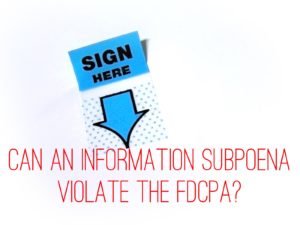By: Robert J. Nahoum

THE PROBLEM:
You come home to certified mail notice from the post office. Knowing that few good things come to you by certified mail; you are immediately concerned. Off to the post office you go to uncover the mystery. When you open the envelope, you are baffled to see a legal looking document that calls itself an “Information Subpoenaâ€. Upon closer examination this document not only tells you that there is default judgment against you but now you have been directed to answer personal questions about your job, your income and your bank accounts.
THE RULES:
After a judgment has been entered, the debt collector is on a ferocious hunt to find your money. The law provides the debt collector with an ample tool-chest of devices to satisfy enforce default judgments. You can have your bank account frozen, your wages garnisheed and even have your property sold. However, if the debt collector isn’t immediately aware of your assets or job, the debt collector is going to turnover every stone until they are found. The primary mechanism, for turning over those stones is the Information Subpoena.
The law allows the debt collector to serve an information subpoena on anyone it has a reason to think might have information about your ability to satisfy the judgment including you, your employer, your friends and your family.
An information subpoena asks specific questions about the assets and income of a judgment debtor such as “where does the judgment debtor work†and “where does the judgment debtor have bank accountsâ€. The subpoena is delivered by certified mail return receipt requested with instructions that the recipient must answer within seven days of receipt or be subject to contempt of court claims.
Federal debt collection laws, known as the Fair Debt Collection Practices Act (FDCPA for short), regulates the conduct of third party debt collectors. The FDCPA generally prohibits debt collectors from using abusive debt collection tactics that are false, misleading and harassing.
If a debt collector violates the FDCPA, you can sue for statutory damages up to $1,000.00, actual damages (like pain and suffering) and the debt collector may have to pay for your attorney. The FDCPA gives consumers the power to swing the pendulum in the other direction and sue the debt collector for violating your rights as a consumer.
The FDCPA prohibits the use of false and misleading information in debt collection communication even when those communication are directed to third parties who are themselves not the judgment debtor.
For this reason, a false representation made in a judgment enforcement device like an information subpoena, could be a violation of the FDCPA regardless of to whom it is sent.
Similarly, under New York law, in order to send an information subpoena, the debt collection lawyer must have a reasonable belief that the person being sent the subpoena has information relevant to the satisfaction of the judgment. If a debt collection lawyer has no such reasonable belief but send the subpoena anyway, claiming that it does, he or she has made a false statement that may be subject to an FDCPA claim.
NY General Business Law (“GBLâ€) §§ 600-603 is New York’s version of the FDCPA ( which is a federal law).  New York’s law closely follows the FDCPA with a few exceptions, one of which relates to information subpoenas. Sections 601 and 602 of the GBL require that a judgment creditor that sends more than 50 information subpoenas per month must maintain records for 5 years on all information subpoenas sent. The records must set forth the grounds for the “reasonable belief†requirement.
WHAT YOU SHOULD DO:
If you’ve received an information subpoena from a debt collector, discuss it with an experienced consumer attorney familiar with debt collection defense and the FDCPA.  If the judgment was won by default or if you have reason to fight the merits of the judgment, you may be able to go to court and vacate the judgment.
If the information subpoena states false information, you may have a claim against the debt collector or its attorney for violating the protections of the FDCPA. If you do have an FDCPA claim, you can sue for statutory damages up to $1,000.00, actual damages (like pain and suffering) and attorneys’ fees.
If you need help settling or defending a debt collection law suit, stopping harassing debt collectors or suing a debt collector, contact us today to see what we can do for you. With office located in the Bronx, Brooklyn and Rockland County, the Law Offices of Robert J. Nahoum defends consumers in debt collection cases throughout the Tristate area including New Jersey.
The Law Offices of Robert J. Nahoum, P.C
(845) 232-0202
www.nahoumlaw.com
info@nahoumlaw.com
